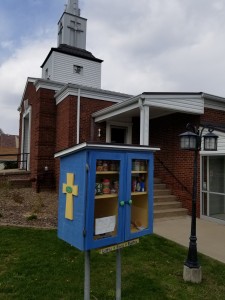
The “Little Free Pantry” that sits outside Ohio United Presbyterian Church in Aliquippa, PA, not only houses food items, but also things like toothbrushes, toothpaste and feminine hygiene products.
Little did the Rev. Nick Marlatt and his Ohio United Presbyterian Church know just how important their “Little Free Pantry” food box would turn out to be to the Aliquippa, PA, community when it was constructed and set up outside its church building two years ago. With the onset of the coronavirus pandemic, this outreach has not only grown in need and participation, but also in meaning.
“It seems like there are more folks in the congregation who have taken ownership,” Nick said, “and as they have conversations with family members or others in the community who don’t go to our church or have this continuous connection to it, it seems to be providing an outlet for folks who want to help. It’s an easy way to love on folks who aren’t working.”
Like the “Little Free Library” boxes that house books and pamphlets for the taking, the pantry is normally filled daily through worshipers’ donations with canned goods and other non-perishable items – plus things like travel-size soaps, toothpaste and toothbrushes, and feminine hygiene products – for the community to take as it needs. It also accepts donations from the community, including home-grown produce. Now, in this time of the coronavirus, the box is being stocked twice a day as stay-at-home mandates and the closing of non-essential businesses has created a greater need for these goods.
“The motto is, ‘Take what you need, leave what you can,’” Nick said. “It’s always open, it’s always there. If people need to grab something, they can grab it. It’s also an opportunity for the community at large to help out and put food in.
“Most days, by the time the person comes back in the evening to restock it, it’s empty. There definitely has been a much greater outside use. There were times before coronavirus that it was moderately stocked, and stuff would sit there for a couple of days. There has definitely been a drastic increase in the use and the need.”
Because people who are receiving government assistance can only use those benefits for food items, the hygiene products that are also available in the “Little Free Pantry” are extremely valuable to the community.
“Those non-food items cost more, but those are also the things that you need but don’t get government help to get,” Nick added.
Ohio United Church in Beaver-Butler Presbytery is located between three of the five school buildings in the Hopewell Area School District and near a couple low-income housing developments. It allows the congregation to play the role of the center-of-town church that is passed by the students who are walking to and from school, thus giving more exposure to the church and its ministry. The congregation also has a weekend backpack program to help students stay nourished when they are not in school.
“It’s this baby-steps effort of looking outside the four walls of the congregation into the local area as a mission,” Nick said. “This is something very low risk that we can do that might have a profoundly significant impact on somebody else’s life.”
This outreach aligns with the Presbyterian Church (U.S.A.)’s invitation for churches to become Matthew 25 congregations. Seeking those who are, among other things, “eradicating systemic poverty,” this movement is highlighting the work being done by PCUSA churches throughout the country. It’s an invitation that Ohio United Church has been discussing, in many ways is already doing and matches up with the congregation’s new mission statement of “Loving God, Loving Our Neighbor, Helping Our Neighbor to Love God.”
“This is part of following God’s call,” Nick said of the work being done by his congregation. “And you begin to see when you follow God’s call that blessings stand out beyond what you may have intended them for in the first place.
“We’re deeply thankful for the individuals who God has laid on their hearts to help out their neighbors, neighbors who they might not ever know or see. It’s a low-bar, passive way of helping, but you see it’s needed, and it helps. Our call isn’t to decide who should come and get it, our call is to provide and to love our neighbor. We believe God will bless those who need to be blessed by the food here and the rest is out of our control.”
